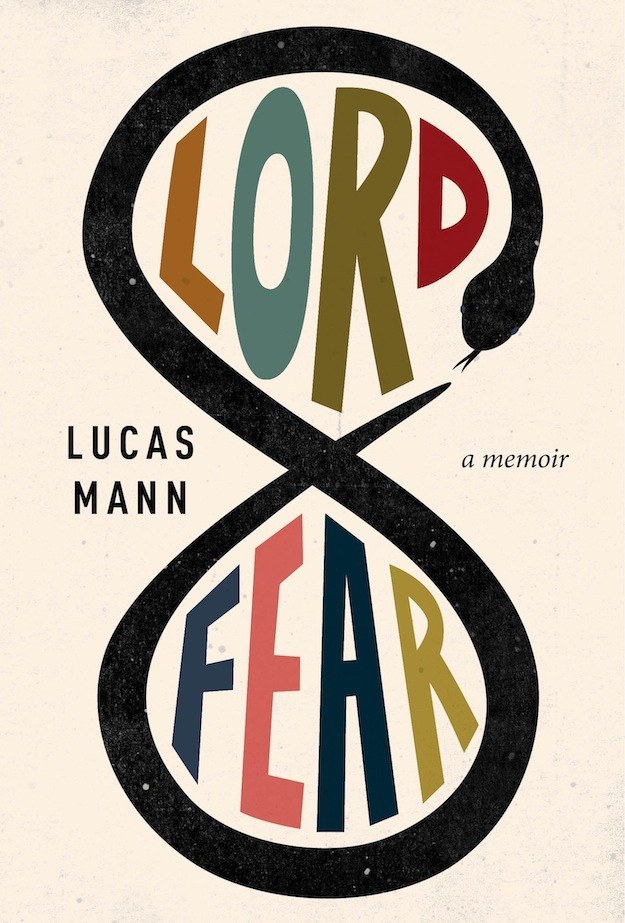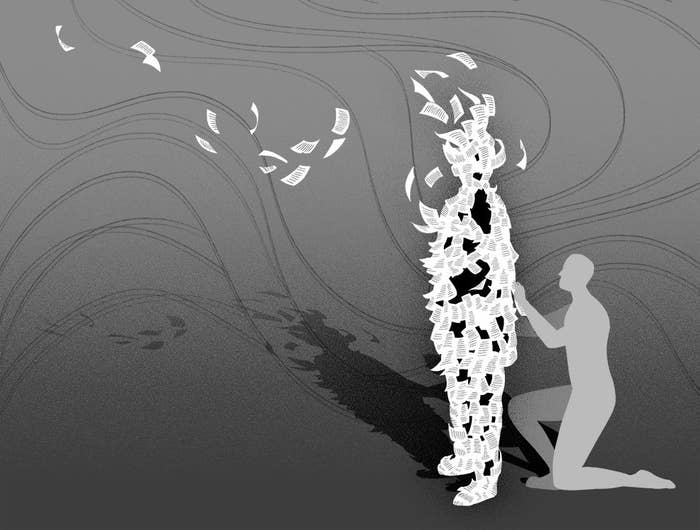
1.
A few nights ago, a pile of final copy edits of my memoir lay on my kitchen table. My wife pulled out champagne. I had finished a story that took me a long time to write. It was a story about addiction and death and grief, with my brother at the center of it, and the memories of a lot of other people splintering out around him.
My brother died of an overdose in 2000. Before he died, he did a lot of bad things, and a lot of good ones, too. Some of those things involved me; most didn't. He was my half brother, a lot older than me, and I idolized him. Like most addiction stories, his carried with it a sizable blast radius. His death became the axis around which all other stories turn. I wrote that in the memoir. I was very proud of that line when I wrote it. That's a beautiful line, I thought. The death right there at the center, so many lives held in its orbit, pulled in by the tragedy.
When the champagne popped, I was hunched over the table, my hoodie pulled tight around my face. I felt sick; I didn't want to look up. I heard myself shouting that I was a bad guy. I was surprised by both the volume of the words and by how much I meant them. For years, my focus had gone into the construction of the book. The moment there was nothing left to construct, I was flooded with questions about the validity of the endeavor, of the book's right to exist.
"I'm a bad guy," I shouted. "I'm a thief."
My wife tilted her head down to try to meet my eyes.
"What have you stolen?" she asked me.
Well, for starters, that line. As soon as I heard myself say it, the realization began creeping up on me. It was my brother's line, one that I'd written. Somewhere toward the end of my manuscript, there's a scene where my father and brother are on a balcony, arguing about my brother's addiction. My father is pushing, trying to understand, and then my brother yells at him, trying to explain. He calls himself a bad guy. He calls himself a thief.
This was a story my father told me, and then I put it in scene: my brother back from rehab, sitting slumped in an old sweatshirt, my father above him, unsure what to do. And then my brother's words, which I found so poignant when my father fed them to me. Somewhere in the retelling, they had become unreal, or a different kind of real. My brother said them to my father; a decade later my father said them to me. Then I wrote them, shaped and reshaped a scene around their existence. At a certain point, one undefinable, I think, they began to feel like mine only.
I was struck by the idea of those words, a junkie's snarled self-assessment. They became a perfect dramatization of guilt: my brother's, yes, but more generally that feeling of something wrong in you that you can't take back. And so when I felt that inward anger and the need to admit it, I reached unconsciously for my brother's words. In trying to acknowledge my guilt, I was perpetuating the very act I'd meant to apologize for.
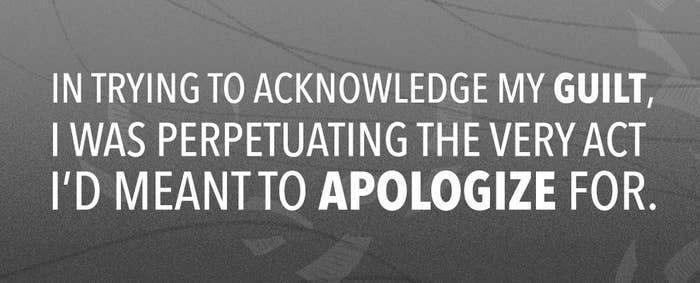
2.
In a recent essay for BuzzFeed Books, Peter Orner writes beautifully about his deceased father and the ways that his father crops up in his fiction. He was, he admits, often unkind to his father through his fictional avatars. But, he writes, "My father never gave me any grief about my work because he was a good and generous reader who understood the difference between nonfiction that tries to tell the truth and fiction that uses the truth to find something else."
What mensches, both of them — Orner for the tenderness with which he acknowledges his father's gift to him; his father for the gift itself, a generosity of perspective that is, in its own way, as creatively liberating as a trust fund. I know this because my father is that kind of mensch. A man who has only gotten a tiny bit rankled at my descriptions of his "gelatinous ass," his "simian upper lip;" who, far more important, has sat supportive through my descriptions of his anger, his disappointment, his grief. Each time he reads my work, I put the expectations of extraordinary empathy on him — see something of yourself in here, see the way that I see you, and then forgive that glimpse because you see past the facts of your representation.
But there is a crucial difference between my father and Orner's father (and Roth's father, too, and Plath's and Knausgaard's, and on and on). My father has never been housed in the fiction section of a magazine or a bookstore. His name has remained the same on the page or, worse maybe, he has gone unnamed for hundreds of pages, identified only as my father, restricted in identity to one very real biological transaction. He has never had the honor of being used to get to that "something else." He is, instead, left on the page to be nonfiction truth, the definitive story.
3.
Art is theft, right? I have seen that on T-shirts; I have heard it slurred in booths at grad student bars, the final answer to every argument. I believe the statement, generally, but I think it needs some explication. The words don't equal each other as much as they operate in tension, always tugging and balancing. The more one word is present, the less the other has to exist. So, in the end, art encourages and simultaneously absolves theft. Art makes the theft of a life, an idea, a perspective, a set of experiences, worthwhile, maybe even noble. It's the mechanism that perverts the truth and somehow, through the perversion, creates a higher truth, one more beautiful and more resonant than what was actually there.
What's tripping me up is that my brother was actually there. And he actually isn't anymore. He actually died in his underwear, next to a bottle of Formula 409 and a sponge, like he was just about to clean his room for a fresh start upon waking. And I wrote that about him. And, goddamn, I still think that's a beautiful image — the forever reach for a clean life, the futility of that reach. When I wrote it, filling in the details around him that I wasn't there to see, imagining his lofty intent with the sponge, I thought only of the beauty that his death provided, the art in writing it down. He became a character, one that I was proud of. The next night, on the next page, when my father knelt over the body, touched two fingers to a cold, pulseless wrist, as I put it, he, too, was a character, distant, broken, numb.
I stole one man's death and the other's grief. I turned one into the story of the addict, the other into the story of grief, and I let my sentences linger in details of sadness. What remains unclear, at least in the conversation that persists about memoir or creative nonfiction or whatever else you want to call it, is whether the stories count as art and deserve the corresponding absolution. If I turned my father and brother into "something else," I would instantly lose track of the aims of nonfiction, but if they were to remain a nonfiction truth, they would be unable to transcend. It is, I think, the bind of the memoirist — the aspiration toward both types of truths and, in many people's eyes, the built-in failure to achieve either.
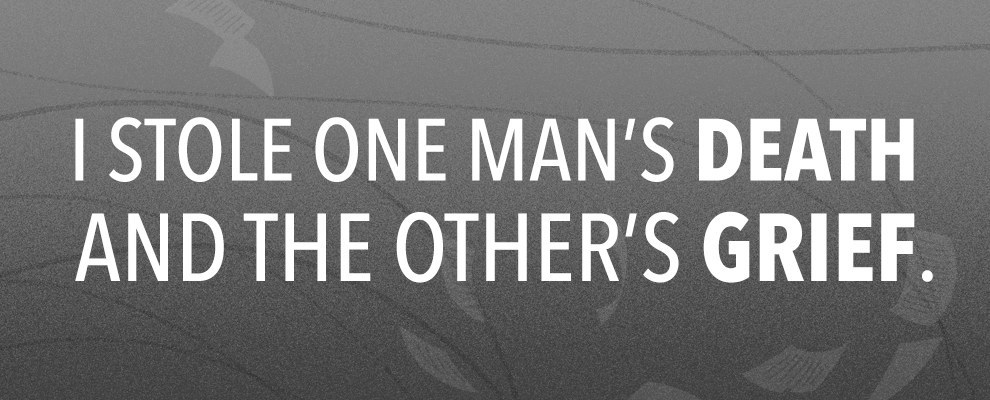
4.
Four years ago, in the New York Review of Books, Lorrie Moore went after a trio of memoirs, and memoirists in general, bemoaning the fact that their lives weren't as interesting as Brigitte Bardot's and then accusing them of "attempting to sneak into the world of narrative through the back door." They lacked the talent to invent (or convert into) fiction, so they took the easy shortcuts available through birthright. They were thieves in the night, stealing both the material for a story and the title of writer in a single B&E. She was not merely calling into question the execution of these books; she was trashing the motives behind their creation, the moral and artistic worth of their authors.
Her argument hinges on the nonfiction value of the life, or lives, being chronicled. Why should anybody give a shit about this thing that really happened? As a reader and a proponent of personal writing in general, it's usually easy for me to hate essays like Moore's. They are nasty and trolling; their logic is obviously, and I would say intentionally, flawed; they reduce an entire genre to its worst iterations; they claim absolute certainty about where art lies and where it doesn't.
I want to be able to dismiss these ideas as completely wrongheaded. But I can't ignore the fact that I found my own life lacking in conflict or tragedy, or any of the other things that light a narrative and then fuel the flame, and I didn't trust myself to invent, so I took the closest tragedy, one that was just enough mine to write. And lately, as I spend the early mornings obsessing over a manuscript that I can't let go of, I think of Lorrie Moore and I wonder what right I have to tell what I am telling. I'm pretty sure she would agree with the answer I come up with: I have no right, beyond that of being a person who wanted to write a book and then did. Which is, of course, the definition of any kind of writer. Still, I wonder: Would I sleep better if I'd written a novel? With each traceable level of removal, would I grow more certain that I'd done enough work to earn the lives on the page? More important, if my father were to encounter a man who looked nothing like him, in a book with a narrative that was not his life, in a setting that I invented, and watch this stranger angrily turn his back on an addict son, would that distance be enough to increase the universality of the image for him? To decrease the sting?
5.
Shortly before Thanksgiving, I got an email from a writer I admire. He signed off with, "Enjoy your last Thanksgiving before your family memoir comes out!"
If it was meant as a warning, it was a gentle one; the tone read more just funny. Still, I thought of it often in the following weeks, the idea of a near future in which life didn't imitate art, but instead reacted to it angrily.
I skipped family Thanksgiving. My parents drove up to my house for Christmas Eve. My wife made fish, a traditional Italian thing, and we all remarked on how good it was. We drank wine and told shared stories and laughed. After dinner, we drank more wine and I pulled out the newly arrived first galleys of the book. My parents were proud and happy, but there was that other layer.
"I was nervous at first," my father told me. "Not for myself, for him. I didn't want my son to be bared in public like that."
But he said when he read the manuscript, he stopped reading himself or any of his sons or anyone he knew. He read parts of them. He recognized moments that he lived, remembered telling those stories to me. Any recognition was fragile and incomplete — the way I saw the way he saw his son in one moment that happened so long ago.
"I read it like a story," he said.
I had failed to capture him, and that made us both breathe a little easier.
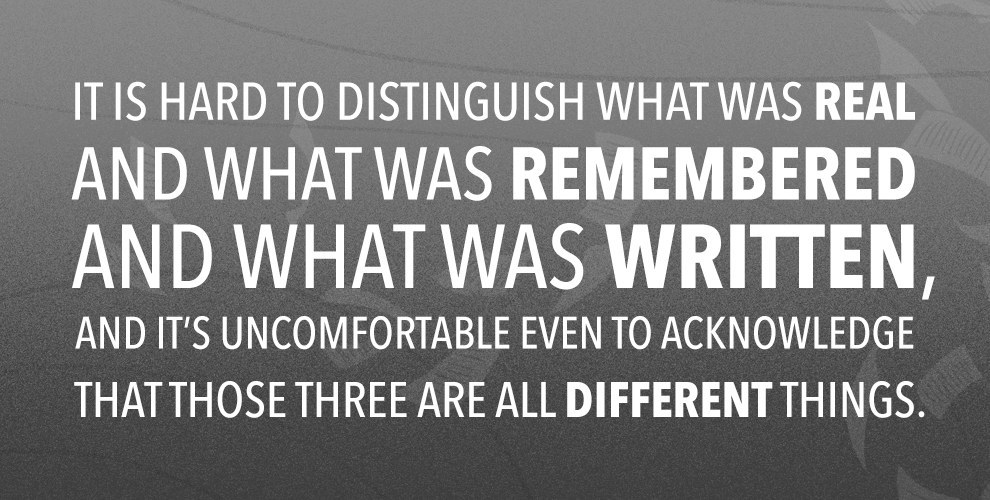
6.
It is hard to distinguish what was real and what was remembered and what was written, and it's uncomfortable even to acknowledge that those three are all different things.
There is my brother, threatening, with his boa constrictor on his shoulders. There is my brother in a bathtub, midway through a detox, writhing. There is my father, a man who doesn't want to see trouble, turning away. There's the two of them together, snarling. I don't know how much of this I remember. Some of it I was there for. Some I was told about, in different ways, by different people, and so those expressions, those emotions, were my imagining of someone else's imagination of someone else's life. Or something like that. Some, I'm not sure. It's hard to go back and find the nonfiction that was there, the kernel of what was, before the story.
I don't know if I remember my brother anymore. That's a loss that I've only just begun to acknowledge. I think that the act of writing him, of making him, has become the memory. In this way, I have stolen even from myself. Prose demands a narrative of some sort, and that is a crucial distinction between story-making and lived experience. I placed my brother's death at the center of a story, and then every memory became tied to and tainted by a narrative that ended that way.
He carried me on my shoulders when I was a little boy. I love that memory and it's mine, but I told it and now it's a little less mine and a little less real. The question becomes, again and again: Do I regret giving that up? Yes. Then the next question: Would I take it back? No.
7.
I don't suppose that these tensions ever end, between the real people that a writer knows and the version that ends up on the page, between the fact and the creation and the morality of whatever combination they arrive in. I don't know if there is a way for me to frame this concept that won't come off as defensive, or looking for some kind of absolution.
I think there is art to be made from what my brother lived and how my father continues to. I want there to be value in saying that, maybe even kindness too, but I'm not sure there is. It is a far more valuable, far kinder act for my father to look at his story after I've written it and try to find art there. That's an act of generosity that is impossible for any writer to repay, regardless of genre. I am grateful for the moments that I have pilfered and the people who lived them. I hope that's enough.
***
Lucas Mann is the author of Lord Fear: A Memoir and Class A: Baseball in the Middle of Everywhere. He teaches writing at the University of Massachusetts, Dartmouth.
To learn more about Lord Fear: A Memoir, click here.
